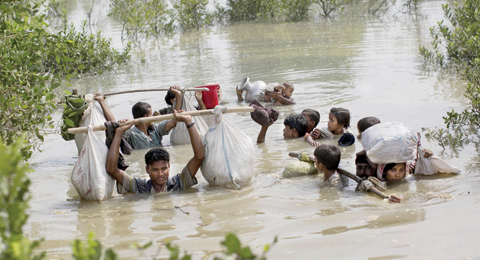Refugee arrival raises fears of humanitarian disaster
 COX’S BAZAR: A Rohingya family reaches the Bangladesh border after crossing a creek of the Naf river on the border with Myanmmar, in Cox’s Bazar’s Teknaf area. — AP
COX’S BAZAR: A Rohingya family reaches the Bangladesh border after crossing a creek of the Naf river on the border with Myanmmar, in Cox’s Bazar’s Teknaf area. — AP
COX'S BAZAR: Nearly 125,000 mostly Rohingya refugees have entered Bangladesh since a fresh upsurge of violence in Myanmar on August 25, the United Nations said yesterday, as fears grow of a humanitarian crisis in the overstretched camps. The UN said 123,600 had crossed the border in the past 11 days from Myanmar's violence-wracked Rakhine state. Their arrival has raised fears of a fresh humanitarian disaster as already crowded camps in Bangladesh-home to around 400,000 Rohingya refugees before the latest crisis-struggle to cope with the influx.
Many are sleeping in the open air and are in dire need of food and water after walking for days to reach safety, the UN's main coordinator in Bangladesh said in a report. "There is an urgent need for emergency shelters and for land to build these shelters on," said Vivian Tan, spokeswoman for the UN refugee agency. "These people have walked for days. Some of them haven't eaten for days since they left. They survived on rain water and ground water."
Bangladesh initially tried to block the refugees, stepping up border patrols and pushing some back into Myanmar. But in recent days they appear to have largely given up trying to prevent an influx that Prime Minister Sheikh Hasina said yesterday was a "big burden" for Bangladesh. Bangladeshi rights campaigner Nur Khan Liton said a "massive humanitarian crisis" was unfolding. "People are staying in refugee camps, on the roads, school yards and under open sky. They are clearing forest to create new settlements. There is an acute crisis of water and food," he said.
Decades of persecution
The latest unrest broke out when a Rohingya militant group launched a series of coordinated ambushes on Myanmar security posts in response to what it said was a fresh crackdown. The Muslim Rohingya are seen as illegal immigrants in mainly Buddhist Myanmar and have suffered decades of persecution, according to rights groups.
Unverifiable testimony from those who have fled has alleged tit-for-tat mass killings and villages being torched by the army, Buddhist mobs and Rohingya militants. At least 11,000 Rakhine Buddhists and Hindus have also fled arson and attacks by militants to camps inside Myanmar, according to the last government update. Last week the World Food Program said it was suspending aid in Rakhine state as the humanitarian situation deteriorated.
Landmines
Bangladesh border officials say those fleeing are also facing the risk of landmines on the frontier between the two countries. Yesterday, two Rohingya children were injured by an apparent landmine blast as they tried to flee unrest in Myanmar, border guard commander Manzurul Hasan Khan said. "They stepped onto some sort of explosives this morning and one of them lost his leg," Khan said. The incident came after a Rohingya woman had a leg blown off in the same area on Monday, raising fears that the border area had been deliberately mined.
It is not known what caused the blast, which he said was well inside Myanmar territory, but Khan said he believed it was a landmine. All three have been taken to hospitals in Cox's Bazar, the nearest city to the border, where hundreds of thousands of Rohingya-a stateless Muslim minority-have taken shelter in camps. Khan said many Rohingya were also entering Bangladesh with bullet wounds, although it was impossible to say how these were sustained as media access to the worst-hit parts of Myanmar's neighboring Rakhine is limited.
Rakhine has been a crucible of religious violence since 2012, when riots erupted. Scores of Rohingya were killed and tens of thousands of people-most of them from the Muslim minority-were forced into displacement camps. But the current round of fighting, which broke out when Rohingya militants ambushed security installations, is the worst yet. Myanmar's army has said nearly 400 people have died in the fighting that ensued, including 370 Rohingya militants.--AFP




